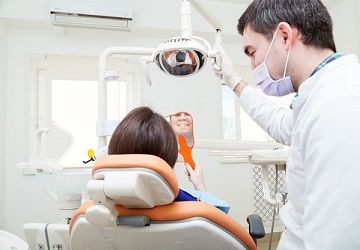Recognizing and Addressing Drug-Seeking Behavior in Your Practice
The opioid crisis in the U.S. affects a diverse population. As doctors with the power to prescribe, dentists should be aware of the giveaways of a drug-addicted patient seeking opioid medications. Continue below for a Q&A with Dr. Dan McNeil, principal investigator for the West Virginia University arm of the Center for Oral Health Research in Appalachia.

More than 50,000 U.S. citizens died due to overdose in 2016, the highest ever recorded.
Thanks in part to an onslaught of over-prescription of licit opioid medications, overdose deaths kill tens of thousands of Americans a year. It is now up to doctors to heal the problem the medical industry helped create, but the prevalence of addiction has turned notions of what an addict is on its head. Parents, white collar workers and even health care professionals themselves are among the masses of opioid abusers.
RELATED:
- The Best Compensation Package for Hygienists
- Oral Health in the Heart of Opioid Country and Beyond
- 7 Estate Planning Moves to Make Now
New studies suggest that dentists are a part of the problem due to longtime reliance on pain pills like oxycodone and Percocet for their patients’ extraction-related pain. Decreasing this reliance can help curb future addiction and abuse rates. But for patients who are already opioid dependent, dentists must learn to recognize their drug-seeking behaviors and respond with compassion. DMD spoke with Dr. Dan McNeil, principal investigator for West Virginia University’s Center for Oral Health Research in Appalachia, to find out what dentists should know to help addicted patients.
Q: What should doctors and hygienists look out for? How can they recognize drug-seeking behavior, especially if it is covert? Anecdotes are helpful in answering this question.
A: “Patients who ask for extraction of a restorable tooth, and also ask for a specific opioid medication by name, may well be ones who have addiction or other drug-related problems. Additionally, those who ask for a full prescription (e.g., 30 tablets) when the dentist writes a prescription for six or eight tablets may have addiction-related problems as well. Post-operatively, after an extraction, patients who repeatedly contact the dentist for more pain medication may be drug-seeking, although dentists never should simply dismiss patients who are reporting pain.”
Q: How can they help these patients get referred to drug and psychological treatment?
A: “Dentists can have a list of local referral agencies, with contact information, on paper, and listed on their web sites, to give to patients. They may also wish to have public statements in their offices and on their web sites that they support efforts to curb problems with addictions in our society, and want to fully address patients’ problems with pain, but also not put them at risk for addiction.”
Q: What if a patient is not covered or cannot afford the cost of rehabs or detox? What affordable options are available?
A: "This depends on the locality. Local mental health and addiction service agencies can provide this information to dentists. There often are resources available to truly invested patients. Sometimes, patients can use the presumed cost of treatment as an excuse to not even considering addiction treatment, which is a frightening possibility to them."
Q: How can doctors have a positive impact on drug-seeking patients without getting over-involved? In the case of insistent or agitated patients who come in seeking prescriptions, what strategies can dental professionals use to resolve the situation?
A: “Dentists, hygienists, and dental staff can educate themselves about addictions, and go beyond enforcement issues, and become familiar with treatment options, so they can discuss them knowledgeably with patients. Getting CE related to addictions would be an excellent idea. ‘Motivational Interviewing’ is a method that is available to oral health professionals and has been specifically applied to dental situations. It is a humane, caring, but forthright way of working with patients who have ambivalence about changing their addictive behaviors.”
Q: Some dentists are more familiar than others with drug abuse. The life of an oral health care provider that treats populations like the one your team studies can seem very different on the surface. But seeing that the opioid epidemic knows no boundaries, should all dentists be prepared to respond to potential overdoses? If so, how can they prepare themselves?
A: “In today’s world, dental offices and clinics should be prepared to deal with potential overdoses, as any health care providers. Again, CE about overdoses, but also about Motivational Interviewing and the nature and treatment of addictions would be helpful.”
Q: What do you wish dentists understood better about addicts?
A: "I hope that dentists, hygienists, and dental staff can look beyond the often perplexing, annoying, and worrisome behaviors of drug-seeking patients, and see the human being who is suffering with an addiction disorder."
Q: Can practices be implicated legally for prescribing opiates to someone who abuses them, or even overdoses as a result of their prescription? If so, how, and what impact can this have on a practice’s reputation and finances?
A: "This question is a legal one, and would best be answered by an attorney, or a state dental agency or dental society. It is state-specific. My understanding is that in West Virginia, persons who become addicted to prescribed drugs can seek legal action against the prescribers. But, I am not an expert in this area, and so urge you to seek further information, and again, this is specific to the state in which one practices."
According to alllaw.com, patients in most states have a case if they can prove a physician was negligent in their prescription of opioid painkillers. Click here to find out more about the criteria for negligence.
Discover more Dentist’s Money Digest® news here.